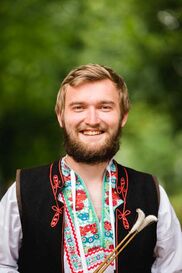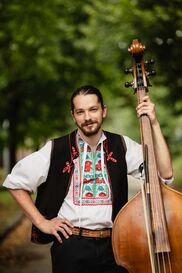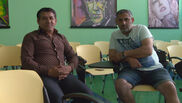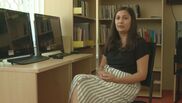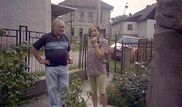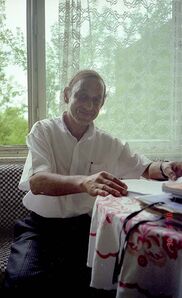Martina Ďuriková Cínová
created: 08. 03. 2023 15:26 modified: 30. 10. 2023 10:10
Martina Ďuriková Cínová, DiS.art. comes from the village of Hnilec, from the family of musicians.
She studied violin at the conservatory in Košice, and since 2020 she is a student at the Catholic University in Ružomberok, Department of Music and Church Music. From 2014, she worked as a music teacher at the Elementary Art School in Smižany. Since 2007, she has been a member of Štefan Cína's Folk Music, the band recorded a CD called Ja chlapec chudobni/I am a Poor Guy. The band composed and recorded part of soundtrack of the Slovak film Loli paradička/Red Tomato. The band also recorded the CDs of the Folklore Ensemble Orgonina, and the Folklore Group Jamničan. Together with the band, they took part in several large TV programs, in 2017 it was the TV show Zem spieva/The Earth Sings, in 2018 Československo má talent/Czechoslovakia has Talent.
category: fine arts
tags: secular digital artistic in persona photography Martina Ďuriková Cínová general audience internal
Štefan Vansač
created: 08. 03. 2023 14:43 modified: 30. 10. 2023 10:13
Štefan Vansač comes from Spišská Nová Ves. He studied cimbalom at the Conservatory in Košice. Currently he teaches music at the Elementary School of Arts in Spišská Nová Ves as well as at the Elementary School of Arts in Smižany. He is a member of the Štefan Cína’s Folklore Band since 2015, the band recorded a CD called Ja chlapec chudobni/I am a Poor Guy. The band composed and recorded part of soundtrack of the Slovak film Loli paradička/Red Tomato. The band also recorded the CDs of the Folklore Ensemble Orgonina, and the Folklore Group Jamničan. Together with the band, they took part in several large TV programs, in 2017 it was the TV show Zem spieva/The Earth Sings, in 2018 Československo má talent/Czechoslovakia has Talent.
category: fine arts
tags: secular digital artistic in persona photography Štefan Vansač general audience internal
Ján Jóny
created: 08. 03. 2023 14:34 modified: 30. 10. 2023 10:20
Ján Jóny lives and works in Michalovce. From an early age he was taught to play the violin, but he acquired his musical education in playing wind instruments, first at the Military Conservatory in Roudnice nad Labem in the Czech Republic, where he studied playing the tuba, later at the Conservatory in Košice. For several years he worked as a member of the Military Music of the Slovak Armed Forces. Later he returned to playing the violin and started playing with several folk ensembles. Since 2014, he has been working at the Jurošík Private Elementary Art School in Michalovce as a music teacher and is currently also a member of Štefan Cína's folk music.
category: fine arts
tags: secular digital artistic in persona photography Ján Jóny general audience internal
Peter Pavlík
created: 08. 03. 2023 14:26 modified: 30. 10. 2023 10:15
Mgr. Peter Pavlík, PhD. comes from Spišská Nová Ves. The music education he received at the Prešov University in Prešov, he graduated with his Master’s degree as a teacher of music art and technology. He completed his postgraduate studies at the Matej Bel University in Banská Bystrica in the field of preschool and elementary pedagogy. Since 2021 he works as a teacher of music at the Private Elementary School of Arts in Zvolen. He is a member of the Štefan Cina’s Folklore Band since 2014, the band recorded a CD called Ja chlapec chudobni/I am a Poor Guy. The band composed and recorded part of soundtrack of the Slovak film Loli paradička/Red Tomato. The band also recorded the CDs of the Folklore Ensemble Orgonina, and the Folklore Group Jamničan. Together with the band, they took part in several large TV programs, in 2017 it was the TV show Zem spieva/The Earth Sings, in 2018 Československo má talent/Czechoslovakia has Talent.
category: fine arts
tags: secular digital artistic in persona photography Peter Pavlík general audience internal
Štefan Cína
created: 08. 03. 2023 14:26 modified: 30. 10. 2023 10:25
Mgr. et Mgr.art. Štefan Cína comes from the village of Hnilec, where he was born into the family of musicians. He studied accordion at the Jozef Adamovič Conservatory in Košice, later went on the Prešov University in Prešov where he studied Teaching of Music Art and Technology, he achieved the bachelor’s degree. He received his master's degree at the Catholic University in Ružomberok in the field of Music and Church Music, and later studied the accordion at the Ternopil National University of Volodymyr Hniatuk in Ukraine. He currently works as a music teacher at the Private Elementary School of Arts in Odorín.
In 2007 he started the Štefan Cína's Folk Music, the band recorded a CD called Ja chlapec chudobni/I am a Poor Guy. The band composed and recorded part of soundtrack of the Slovak film Loli paradička/Red Tomato. The band also recorded the CDs of the Folklore Ensemble Orgonina, and the Folklore Group Jamničan. Together with the band, they took part in several large TV programs, in 2017 it was the TV show Zem spieva/The Earth Sings, in 2018 Československo má talent/Czechoslovakia has Talent.
category: fine arts
tags: secular digital artistic in persona photography Štefan Cína general audience internal
Jozef Červeňák
created: 23. 02. 2023 11:13 modified: 16. 03. 2023 08:12
PhDr. Jozef Červeňák was born in Dobšiná, the Rožňava district. He graduated from the Faculty of Social Sciences of the University of Konstantin the Philosopher in Nitra. In 1993 he started to work at the Roma Community Center in Rožňava, from 1998 to 2004 he lead the cultural and educational organization Roma-Gemer. Later, he also worked as the Headperson of the Municipal District Luník IX in Košice (2006 – 2007) and national coordinator of national projects financed from the sources of the European Union (Methodological and Pedagogical Center in Prešov). He passed away during the Covid-19 pandemic, in November 2021 in the village of Roštár, where he is also buried. The interview was produced by the Art Society Ltd. Project titled Roma, 30 years after... supported by the Fund for Development of Culture of National Minorities, in 2018.
category: speaking
tags: retrospective biographical monologue guided Slovak Jozef Červeňák general audience internal
Alexander Daško a Vladimír Sendrei
created: 15. 02. 2023 14:59 modified: 16. 02. 2023 15:04
Vladimír Sendrei, a singer and frontman of the music group Sendreiovci and Kokavakere lavutara. He is the chairman of the Civic Association Latcho Drom and the main organizer of the music festival Balval Fest.
Alexander Daško comes from Čierny Balog. He is a musician, together with his band became well-known not only in Slovakia. He attended the Conservatory in Žilina, later graduated from the Pedagogical Fakulty of Matej Bel University. In Banská Bystrica, for many years already, he has been organising the festival Cigánsky oheň (Gypsy Fire); he established and manages his own music school.
The main topic of the interview is their experience gathered in cooperation with foreign musicians. Vladimír Sendrei cooperated with Hans Zimmer who picked him and the band to play his music in the film Sherlock Holmes 2: A Game of Shadows.
Alexander Daško speaks about Goran Bregovič and their common performance at the concert in Banská Bystrica. The other topics are contemporary Romani music in Slovakia, music inspirations and plans for future.
category: speaking
tags: retrospective biographical dialogue guided Slovak Alexander Daško Vladimír Sendrei Hans Zimmer Goran Bregovič general audience
Lenka Goroľová
created: 15. 02. 2023 14:48 modified: 31. 03. 2023 13:52
Lenka Goroľová lives in the village of Hlinné, district of Vranov nad Topľou. She attended the elementary school in Hlinné, late in the neighbouring village Soľ. She received her secondary education at the State Grammar School (currently renamed as The Cyril Daxner Secondary Grammar School) in Vranov nad Topľou. She graduated from the Catholic University in Ružomberok as a teacher of the Slovak language and literature and Philosophy. After that she started working as the field social worker in Hlinné, then the teacher assistant in Soľ, later on she spent some years teaching Slovak and Romani languages at the Private Secondary Pedagogical and Social Academy in Košice. Currently, she is a teacher of the Romani language at Prešov University in Prešov, The Institute of the Romani Studies.
In the interview she speaks about her personal and professional life and studies since her childhood until present days.The interview was recorded on July 6, 2021 in the Romani Studies Room of the State Sciencetific Library in Prešov.
category: speaking
tags: retrospective biographical monologue guided Slovak Romani Lenka Goroľová general audience internal
Jaroslav Cicko - Statues
created: 01. 02. 2023 13:24 modified: 01. 02. 2023 13:28
Archive photo of OZ Jekhetane-Spolu, which captures the Roma carver and sculptor Jaroslav Cicko.
The author of the photo is Jozef Ferenc, the photos were taken in the village of Horná Štubňa, where the carver and sculptor lived. The photos capture his sculptures, but also the meeting with Daniela Hivešová-Šilanová. The date of the photograph is not shown on the film.
Jaroslav Cicko is a well-known Romani artist and sculptor who created his works mainly from wood, but also stone.
He was born on March 25, 1939 in Martin and died on November 18, 2010 in Horná Štubňa in the district of Turčianske Teplice.
He worked as a toolmaker at the Heavy Engineering Plant in Martin and as a carver at the Martin Studio of Non-Professional Artists. He was a lecturer at symposia of non-professional artists.
In 2000, he exhibited his works and demonstrated various methods of creating his works in Germany, the Czech Republic, Spain, France and Italy.
The most common motif of his works is a woman in all her forms.
category: fine arts
tags: secular material digital artistic in persona photography Jaroslav Cicko general audience internal
Ján Šándor - At Home
created: 01. 02. 2023 13:08 modified: 01. 02. 2023 13:12
Archive photo of OZ Jekhetane-Spolu, which captures the Roma writer Ján Šándor from Prievidza.
The author of the photo is Jozef Ferenc, the photos were taken in the writer's apartment, during the visit of Daniela Hivešová-Šilanová in 1998. The exact date of the photo is not indicated on the film.
He was born in 1948 in Brno (former Czechoslovakia, now the Czech Republic). From the age of 16 he lived in Prievidza until his death. He worked as a laborer all his life.
Since 1979 he published in the magazines Železničiar, Bosorka, Smer dnes, Prieboj, Romano nevo ľil, Sam adaj, Romano džaniben. He made his book debut with a collection of fairy tales and short stories called The Roma Dream (2004). In 2008, the Jekhetane-Spolu association published a book of Romani fairy tales titled The Black Rose, in Slovak and Romani. He has published a total of 10 books.
He was a member of the Slovak Writers' Association.
In 2017, he was awarded the Roma Spirit Award for his lifelong literary work and the development of Roma culture.
category: fine arts
tags: secular digital artistic in persona photography Ján Šándor general audience internal





